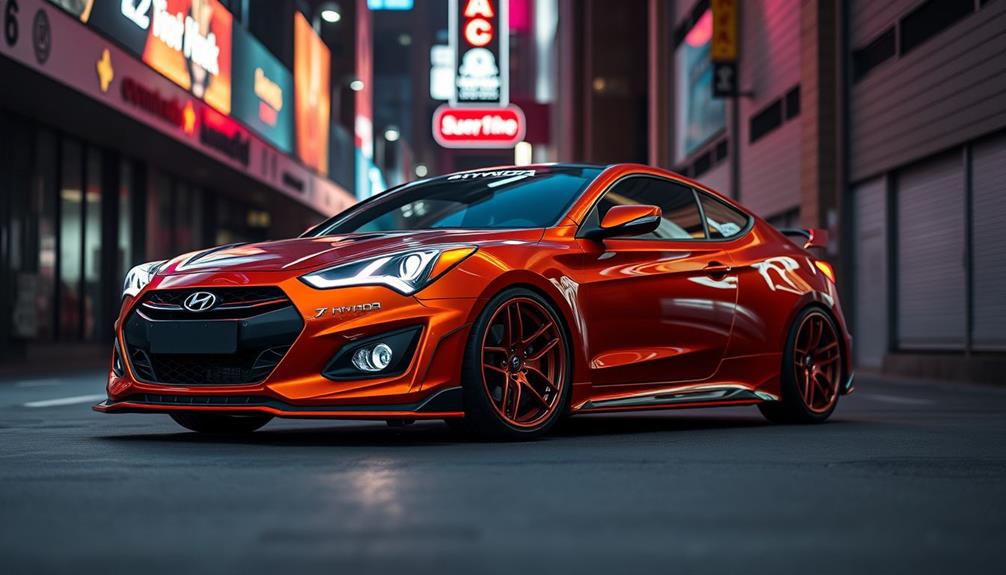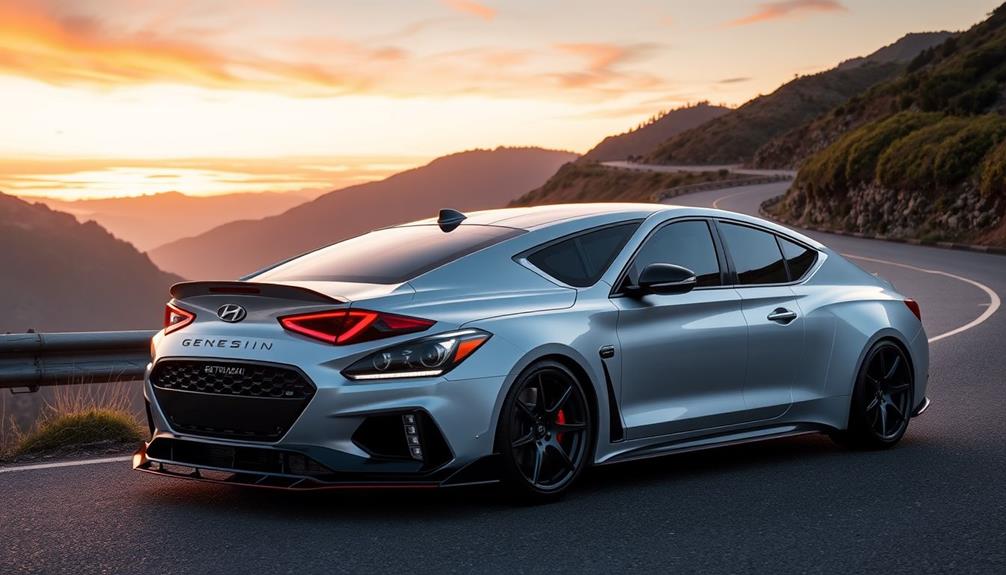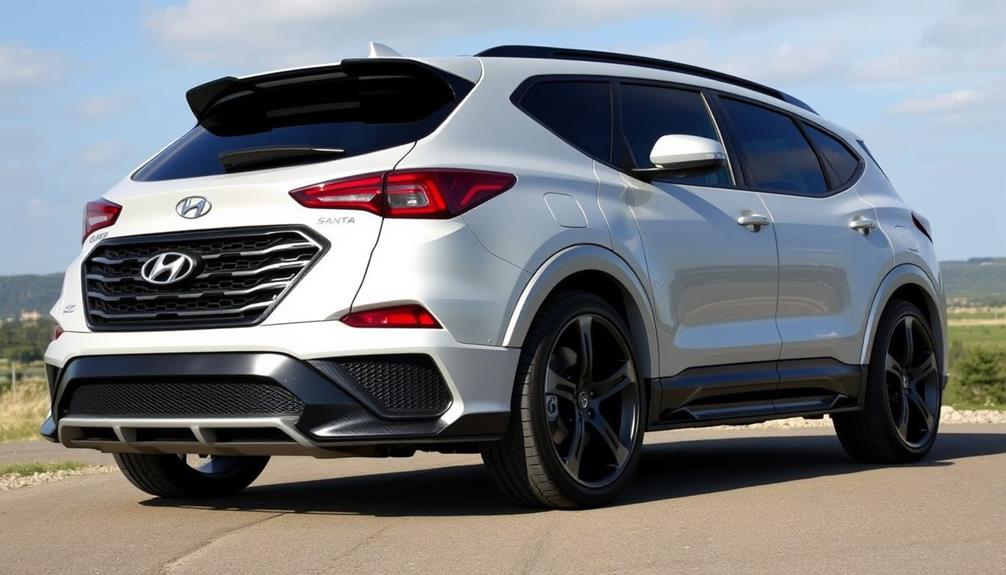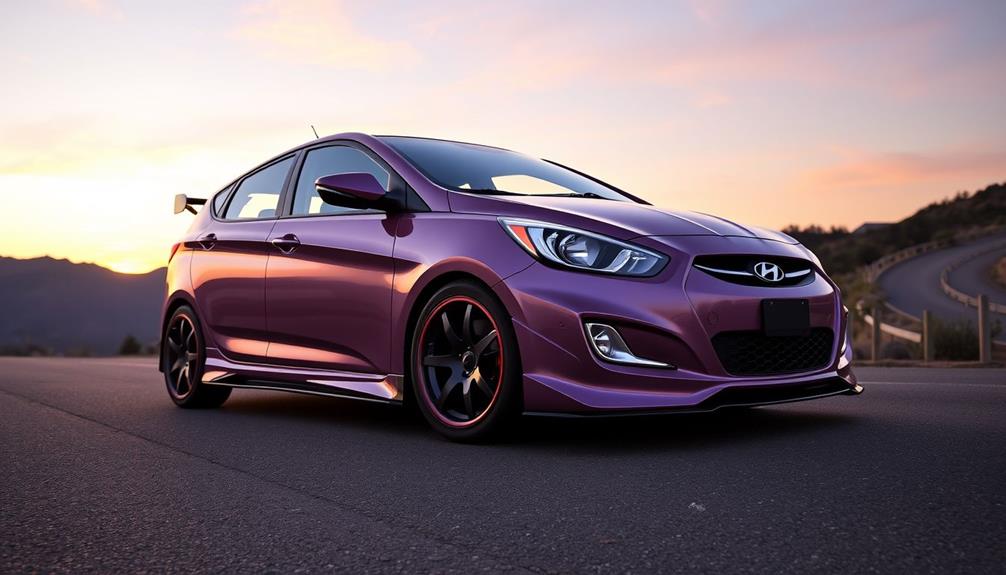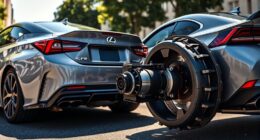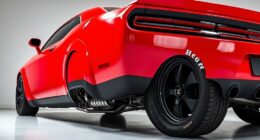Tuning your Hyundai Coupe can turn your compact car into a performance icon. Start with upgrades like short ram induction and headers, which can boost your power by 20-30 BHP. If you're feeling ambitious, consider forced induction for a massive power increase. Don't forget about weight reduction—shedding 25-30 kg can enhance handling and acceleration. Regular maintenance is key, especially if you opt for performance modifications. Engaging with the Hyundai Coupe community can provide valuable tips and shared experiences. Stick around, and you'll discover even more effective strategies to elevate your driving experience.
Key Takeaways
- Start with performance enhancements like short ram induction and upgraded headers to boost power by 20-30 BHP.
- Consider forced induction options, such as turbocharging, for significant power gains exceeding 200 BHP with custom modifications.
- Invest in quality aftermarket parts for better performance and cost-effectiveness compared to OEM options.
- Regular maintenance and comprehensive tuning are crucial for reliability and optimal performance post-modifications.
- Engage with community forums for insights and DIY solutions to save on tuning costs and enhance your vehicle's capabilities.
Performance Expectations and Goals
When setting performance expectations and goals for your Hyundai Coupe, you might wonder how far you can push the stock V6 engine's capabilities. With a base output of around 200 BHP, many enthusiasts find this figure lacking for their performance aspirations.
However, tuning options exist to elevate your Coupe's potential. Modifications like headers, cams, and ECU tuning can yield an additional 20-30 BHP, bringing you closer to 230 BHP.
If you're looking for even more power, consider forced induction options like turbocharging. These can greatly boost your output, often adding over 200 BHP, but be prepared for custom modifications to make it work.
Remember, tuning isn't just about adding power; it's also about balancing your vehicle's overall performance.
Don't overlook weight reduction, either. Shedding 25-30 kg by removing non-essential components can improve acceleration and handling without major sacrifices.
Engaging in community forums can also provide valuable insights on setting realistic performance expectations. You'll find that other Hyundai Coupe owners have shared their tuning experiences, helping you navigate your tuning journey with informed goals.
Recommended Modifications and Upgrades

Upgrading your Hyundai Coupe can transform your driving experience, making it more exhilarating and responsive.
Start with the intake system; a short ram induction can enhance low-end acceleration and boost overall engine performance. For effective initial upgrades, consider performance enhancements like headers, cams, and pulleys—they can yield an impressive 20-30 BHP when properly tuned.
You might also want to explore throttle body boring and port matching the intake manifold, which optimizes airflow and improves engine efficiency.
If you're looking for even greater power, installing upgraded rods and pistons during a block rebuild can markedly increase performance and help you achieve higher horsepower figures.
Engine Specifications Overview
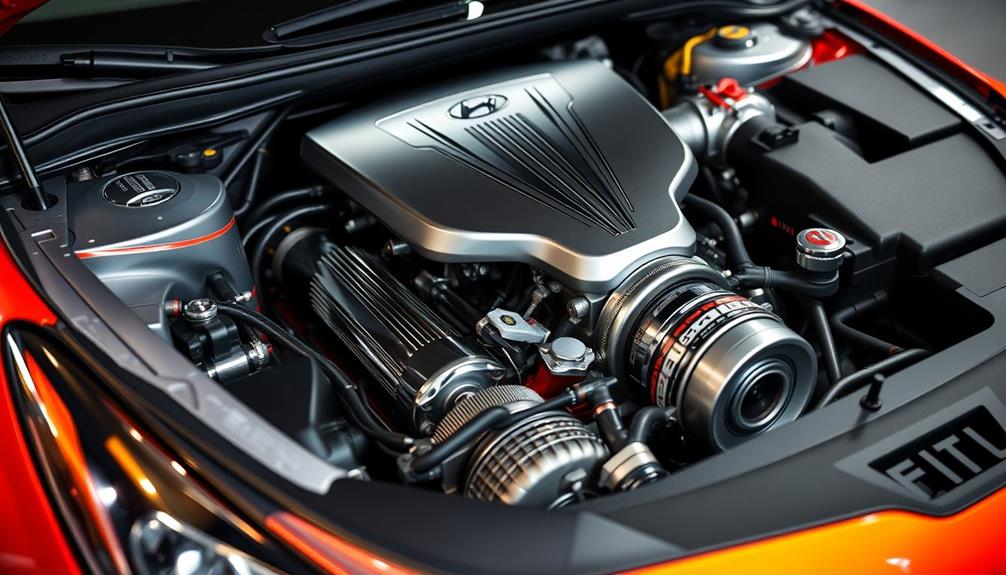
The Hyundai Coupe, particularly with the F 2.0 16V engine, offers a solid foundation for performance enthusiasts. This engine produces approximately 140 hp, with real-world performance often hitting around 130 hp. It features a spirited redline near 7,000 RPM, making every drive exciting.
However, there are some important engine specifications and tuning options to take into account if you want to maximize performance.
Here are four key aspects to keep in mind:
- Performance Chips: Installing performance chips can optimize engine management for enhanced power and responsiveness.
- Natural Aspirated Modifications: While these can elevate output, they typically struggle to exceed 185 hp; initial upgrades can help you reach around 150 hp.
- Throttle Body Boring: This tuning option increases airflow, notably improving engine performance and efficiency.
- Intake Manifold and Head Porting: These methods can further enhance the flow and combustion efficiency, releasing additional horsepower.
While the Tiburon engine and transmission can handle up to 650 hp, keep in mind the common limitations, such as a weak differential, when planning your upgrades.
Reliability and Maintenance Considerations
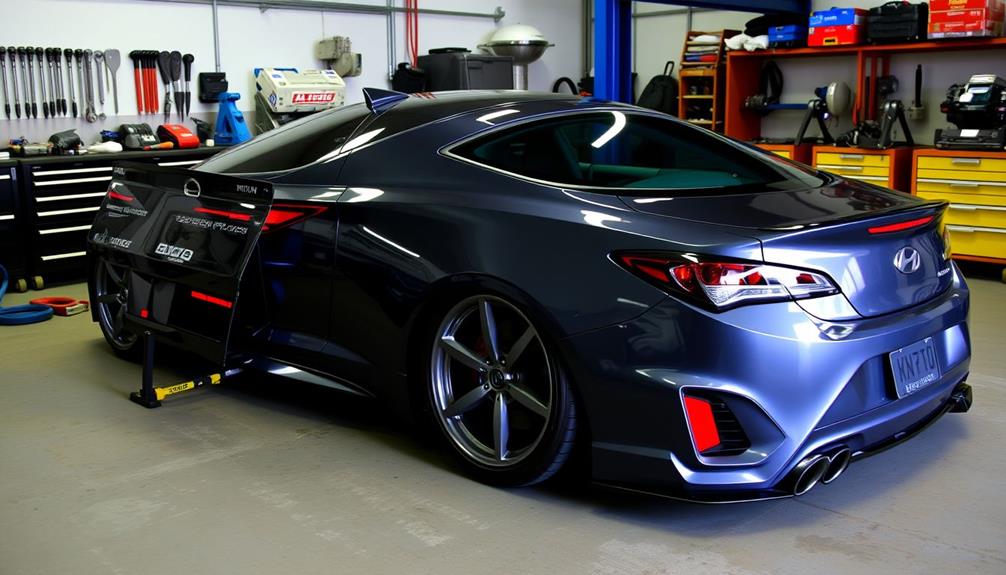
How do you guarantee your Hyundai Coupe remains reliable after tuning? First, it's vital to acknowledge that the V6 engine has noted reliability issues, particularly with big end failures, which can worsen with extensive performance upgrades.
If you're tuning a V6, weigh the financial implications of maintenance against the benefits; long-term ownership often reveals that modded V6 engines can be costly to maintain.
On the other hand, 2.0L engines are generally more robust, making them a favorable choice for those looking to enhance reliability.
Regardless of the engine type, regular maintenance is necessary. Keep an eye on tuned components, as performance upgrades can stress the engine and lead to potential failures if not monitored closely.
Investing in quality aftermarket parts is another way to improve reliability. Thorough research into compatible upgrades helps mitigate common issues often faced by modified Hyundai Coupes.
By maintaining a consistent maintenance schedule and choosing reliable parts, you can enjoy the thrill of tuning without jeopardizing your car's long-term reliability.
Ultimately, staying proactive about maintenance will guarantee your performance upgrades enhance your driving experience rather than diminish it.
Community Engagement and Resources
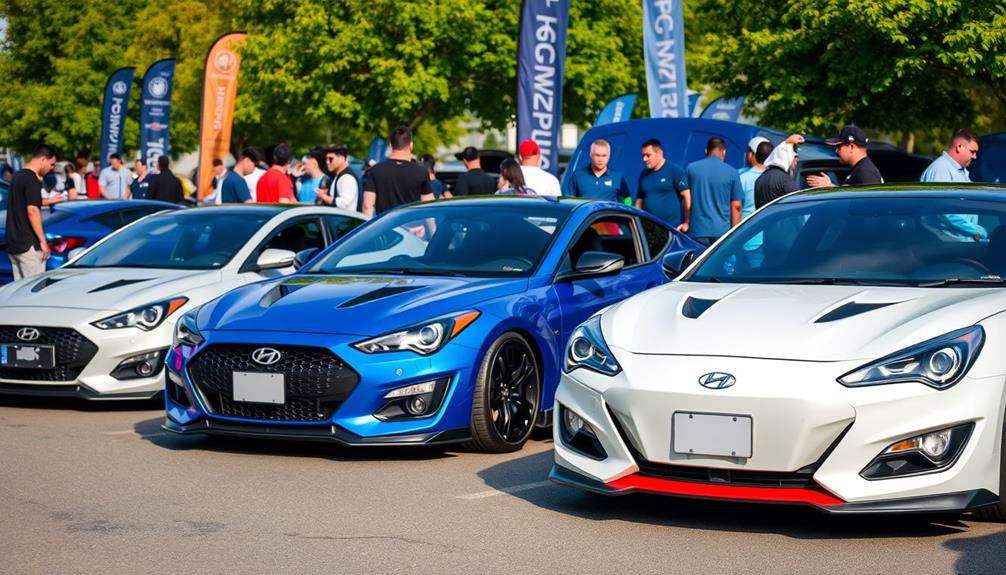
In today's automotive landscape, engaging with the Hyundai Coupe community can greatly enhance your tuning experience.
With over 807,300 posts and 61,400 members, this community is a treasure trove for owners and enthusiasts alike. You'll find a wealth of shared experiences and advice regarding performance modifications that can take your Coupe to the next level.
Here are four ways to maximize your involvement in this vibrant community:
- Join the Forum: Create an account on the Hyundai Coupe forum to access a user-friendly interface filled with organized sections for specific topics and models.
- Participate Actively: Get involved in discussions around performance modifications, troubleshooting tips, and maintenance strategies to learn from others' experiences.
- Share Your Journey: Document your tuning progress and share insights; this fosters a collaborative environment where everyone can grow.
- Explore Resources: Utilize the wealth of knowledge about the latest aftermarket parts available, ensuring you're always in the loop on what works best for your vehicle.
Cost Analysis of Tuning
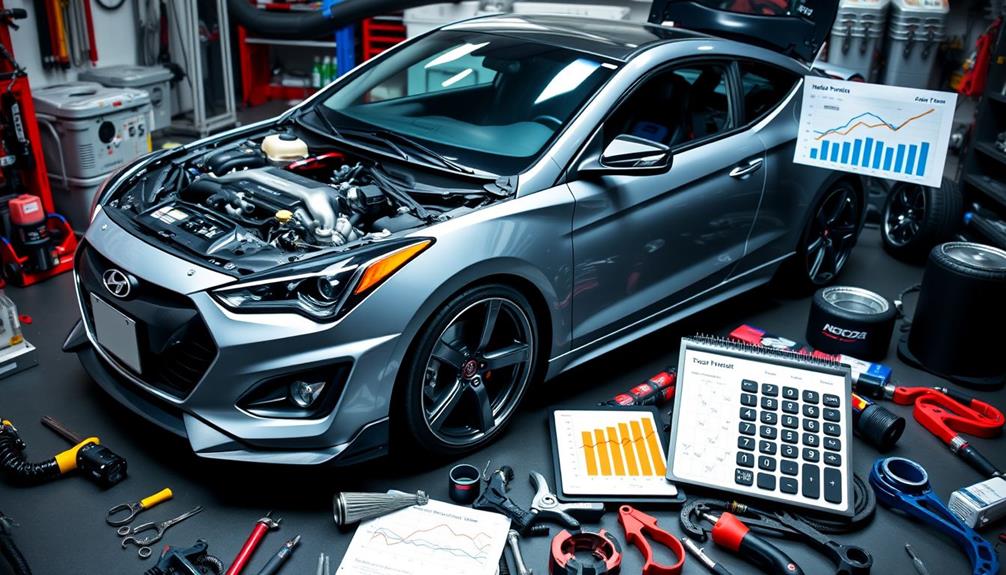
Engaging with the Hyundai Coupe community not only provides valuable insights into tuning but also highlights the financial aspects you need to reflect on.
When you think about performance upgrades, the initial purchase price of around £2,500 for a V6 model is just the start. Adding components like exhaust systems or ECU remapping can set you back anywhere from £300 to over £1,500. This cost analysis is essential; you'll want to budget accordingly to avoid surprises.
Don't forget to take into account insurance costs. For younger drivers, premiums for modified V6 Coupes can soar as high as £1,200, which greatly impacts your overall expenses.
Additionally, keep in mind that performance modifications can lead to increased fuel consumption, especially during short commutes, further adding to your long-term operational costs.
However, engaging with fellow enthusiasts through forums can reveal DIY tuning solutions that save you money compared to professional upgrades.
Aftermarket Vs. OEM Parts
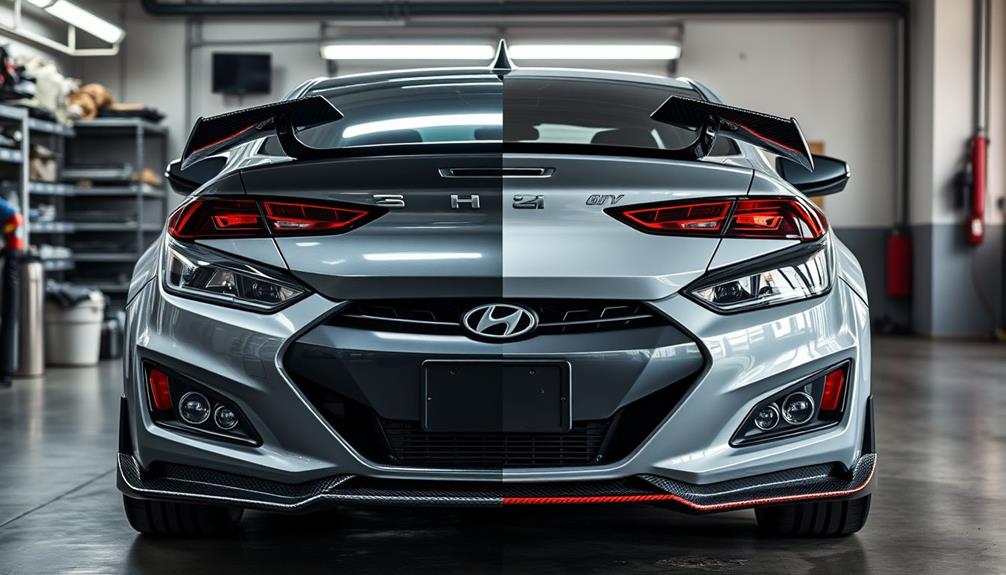
When choosing between aftermarket and OEM parts for your Hyundai Coupe, you'll want to weigh performance, cost-effectiveness, and quality.
Aftermarket options can offer impressive enhancements at a lower price, but OEM parts guarantee reliability and compatibility.
Understanding these factors will help you make the best decision for your tuning needs.
Performance Comparison Factors
The choice between aftermarket and OEM parts greatly impacts your Hyundai coupe's performance. While OEM components are often reliable, aftermarket parts can provide tailored performance upgrades that align with your specific goals as a tuning enthusiast.
Here are four key performance comparison factors to evaluate:
- Cost-Effectiveness: Aftermarket parts frequently offer a more budget-friendly approach to performance upgrades, letting you enhance your vehicle without overspending.
- Improved Performance: Options like the Pedal Commander show that aftermarket parts can enhance throttle response and overall driving experience, often outperforming OEM equivalents.
- Customization: With a wide range of aftermarket parts available for Hyundai models, you can achieve significant customization that OEM upgrades may not provide.
- Engine Integrity: Many aftermarket parts are designed specifically for performance enhancement, ensuring compatibility and reliability that can sometimes exceed OEM specifications.
Cost-Effectiveness Analysis
Weighing the cost-effectiveness of aftermarket versus OEM parts can greatly influence your Hyundai coupe tuning decisions. Aftermarket parts like the Pedal Commander often provide significant performance enhancements at a fraction of the cost of extensive OEM upgrades.
While OEM parts are known for reliability and compatibility, many aftermarket options can outperform OEM components, offering better value for your performance modifications.
By exploring aftermarket accessories such as intakes and exhausts, you'll find they're typically available at lower prices than OEM alternatives. This affordability allows you to pursue more extensive upgrades without straining your budget.
Additionally, utilizing aftermarket parts can lead to substantial savings in the total cost of ownership. These parts often require less frequent replacement and can deliver better performance than their OEM counterparts.
Engaging with the automotive community is essential in your cost-effectiveness analysis. You can discover high-quality aftermarket parts that enhance performance without the premium price tag associated with OEM options.
Ultimately, choosing aftermarket parts can maximize your tuning budget while delivering impressive results for your Hyundai coupe.
Quality and Durability Considerations
Choosing between aftermarket and OEM parts involves critical quality and durability considerations that can impact your Hyundai coupe's performance. OEM parts are often deemed the best for upgrades due to their reliability and compatibility, guaranteeing a perfect fit and adherence to manufacturer specifications.
However, aftermarket parts can also offer significant performance enhancements at a more budget-friendly price.
When evaluating your options, consider these key factors:
- Quality Variability: Aftermarket parts can differ greatly in quality; always research and select reputable brands to avoid potential engine damage.
- Performance Metrics: Many Hyundai owners discover that specific aftermarket accessories provide better throttle response and increased horsepower than OEM components.
- Cost-Effectiveness: Aftermarket parts often deliver similar or superior performance enhancements without the premium price tag associated with OEM options.
- Customization: The extensive range of aftermarket options allows for tailored modifications, enhancing both your vehicle's performance and aesthetic appeal.
Ultimately, whether you choose OEM or aftermarket parts, focus on reliability and compatibility to guarantee your Hyundai coupe remains a performance icon.
Customization Trends and Options

When you think about customizing your Hyundai Coupe, popular modification techniques and aesthetic enhancements can greatly elevate your driving experience.
From performance upgrades that boost throttle response to eye-catching accessories that make your ride stand out, there are countless options to explore.
Embrace the growing community of enthusiasts who share tips and tricks to tailor your Coupe to fit your unique style.
Popular Modification Techniques
In recent years, Hyundai Coupe enthusiasts have embraced a variety of popular modification techniques to enhance their vehicles' performance and aesthetics.
By focusing on key upgrades, you can greatly elevate your driving experience. Here are some standout techniques to reflect on:
- Upgrading the Intake: Improving airflow is vital; a high-performance intake system can yield gains of 20-30 BHP when paired with proper tuning.
- Aftermarket Parts: Installing components like the Pedal Commander enhances throttle response, providing a noticeable boost in performance without compromising engine integrity.
- Coilover Suspension Kits: Achieving better ride height and improved handling dynamics is possible with coilover kits. They allow for precise tuning of spring rates to match your driving style.
- Tire Selection and Maintenance: Quality tires and maintaining proper tire pressure are essential for maximizing handling characteristics and overall performance.
Aesthetic Enhancements and Accessories
Transforming your Hyundai Coupe's appearance is an exciting journey that opens up a world of customization options. Aesthetic enhancements can dramatically change how your car looks and feels, making it truly yours. Consider adding body kits for a sportier profile, enhancing visual appeal while potentially improving performance by reducing weight.
Upgrading to lightweight alloy wheels not only gives your Coupe a fresh look but also enhances handling. Plus, interior modifications like sport seats and custom steering wheels elevate your driving experience.
Here's a quick overview of some popular aesthetic enhancements:
| Enhancement Type | Description | Benefits |
|---|---|---|
| Body Kits | Custom front and rear bumpers | Improved look and aerodynamics |
| Lightweight Alloy Wheels | Stylish wheels that reduce unsprung weight | Better handling and performance |
| LED Lighting Upgrades | Modern lights for better visibility | Enhanced safety and style |
| Custom Vinyl Wraps | Personalized designs and colors | Unique appearance |
With these options, you can transform your Coupe into a standout performance icon that reflects your personal style. Upgrade your Coupe with a spoiler, an aggressive body kit, and a sleek set of wheels to turn heads wherever you go. And if you’re looking for even more customization, consider delving into the world of honda del sol tuning to enhance the performance and appearance of your Coupe even further. With a wide range of aftermarket parts and tuning options available, you can truly make your Coupe one-of-a-kind.
Frequently Asked Questions
Can You Remap a Hyundai Coupe?
Yes, you can remap a Hyundai Coupe to enhance its performance. By optimizing the ECU, you'll boost horsepower considerably. Just make sure you consider professional services to avoid potential engine damage from improper tuning.
How Much Horsepower Does Tuning Your Car Add?
Tuning your car can add anywhere from 20 to 30 horsepower, depending on the modifications you choose. More advanced upgrades, like forced induction, might push that gain to over 200 horsepower, greatly enhancing your driving experience.
Conclusion
As you rev up your Hyundai coupe, imagine the roar of the engine echoing through the streets, each modification breathing new life into your ride. With the right upgrades, you're not just transforming a compact car; you're crafting a performance icon, sleek and powerful. Embrace the journey of tuning, where each tweak brings you closer to your dream machine, and the asphalt becomes your canvas, painted with the thrill of speed and precision. Get ready to turn heads!
